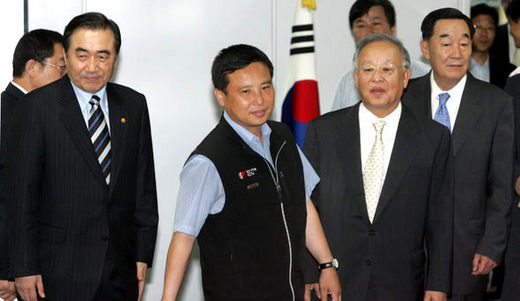 |
|
Labor, management and government delegates gather at the meeting of the Korea Tripartite Commission on July 6.
|
Further conflict predicted after shaky compromise
At the September 2 meeting of the Tripartite Commission involving labor, management, and the government, the three sides agreed to a postpone a ban on companies having to pay salaries to full-time labor union officials. A move to allow a multiple-union system at companies was also postponed. Under current agreement, full-time labor union officials are paid a regular salary by the company or companies which their union covers; companies object to this practice. Current agreement also dictates that a single union is allowed to represent workers at a given company, which labor activists call a means for the companies to establish a "ghost union" that protects workers’ rights on paper alone. Presiding over the decision were Federation of Korean Trade Unions (FKTU) Chairman Lee Yong-deuk, the Korean Employers Federation (KEF) Chairman Lee Soo-young, and Korea Chamber of Commerce and Industry Chairman Sohn Kyung-shik. Conflict is predicted following the decision, as the nation’s other major umbrella labor organization, the Korean Confederation of Trade Unions (KCTU), has raised objections to the agreement, calling a multiple-union system a "basic principle of democratic labor unions."FKTU spokesperson Chung Kil-oh said that because alternative measures had not been prepared, "a ban on companies’ paying salaries to full-time labor union officials may cause the labor movement to collapse, and thus postponing the measure was unavoidable." The FKTU and management had in 2001 postponed the measures for five years, which is why the issues came up for debate again on September 2 of this year. The Ministry of Labor said that it would consult with the ruling Uri Party and give its position on the Tripartite Commission’s agreement within two or three days, but it will be difficult for the ministry to reject the decision. The latest agreement showed a rare example of mutual compromise between the FKTU and management. The FKTU, 80 percent of which is made up of small and medium-sized labor unions, would inevitably face difficulty should companies be banned from paying full-time labor union officials. As for management, if a multiple-union system is permitted, large companies like Samsung and its affiliates, which have several ghost unions, would likely see workers mobilize to form their own unions. At the three-way talks, labor, management, and the government also reached a tentative agreement to abolish the government’s right to intervene in labor disputes involving public-service companies. The three sides, however, failed to reach agreement on other matters; further discussion on those topics is planned. The government said that it would make public a notice concerning the legislation of items agreed to at the talks.





